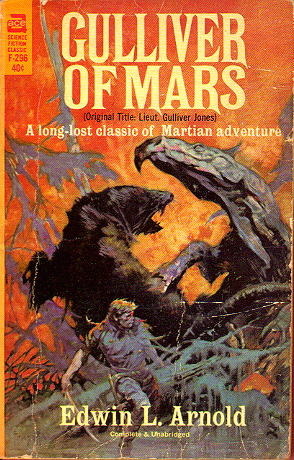Chapter XII — Gulliver of Mars
byChapter XII begins with a haunting stillness that blankets the icy Martian landscape. Gulliver, stranded in this frozen terrain, struggles to survive the biting cold by building a modest fire, unaware that his small flame will awaken more than just warmth. Nearby, encased in a sheet of ancient ice, rests a towering figure clad in regal grey, a circlet of gold bearing strange markings fixed around his head. Though motionless, the figure evokes a presence of immense dignity, as if royal authority had been paused mid-reign. Gulliver, both afraid and intrigued, draws closer, wondering what fate could have sealed such a being in ice. As the fire grows, so too does the tension, until the frozen shell cracks, unleashing an unexpected confrontation. Instinctively, Gulliver battles the icy figure, only to find himself wrestling not a ghost, but a thawing corpse—a relic of another time.
The encounter with the ancient body leaves Gulliver shaken yet fascinated. What history might this frozen noble have witnessed? What stories had been lost with his voice? These questions linger as dawn breaks over the desolate plateau. Hunger soon reclaims Gulliver’s focus, driving him to search the area for sustenance or a path forward. To his surprise, an elderly Martian emerges, collecting shining stones among the icy rubble. Initially frightened, the man assumes Gulliver to be a spirit, pale and out of place in this remote wasteland. Their meeting is cautious but turns cordial after Gulliver proves, through laughter and hunger, that he is very much alive and in need of help. The old man, hardened by solitude, shares his simple provisions—dried root cakes and mineral water—with surprising generosity.
Conversation reveals the woodsman’s strange occupation: he gathers gems flushed out from the ice cliffs by the melting process, remnants of ancient disasters that buried nobles and priests long ago. Gulliver is both awed and unnerved by the thought that so many powerful beings lie entombed beneath his feet, their treasures now scavenged by wanderers. Yet, even in the face of potential riches, Gulliver’s thoughts return to his goal—reaching the Martian capital and completing his mission. He offers his share of gemstones as payment for safe passage and information. The old man, moved more by purpose than by wealth, agrees to lead him through an ancient passageway. The route, seldom traveled, is said to cut through the heart of the glacier—a narrow trail filled with frozen remnants of Martian history.
Their journey through the icy fissure is grim and awe-inspiring. Towering walls of frost encase rows of long-dead figures, some noble, others monstrous, each one preserved in eternal silence. Their faces, still contorted with emotion, suggest moments of desperation or ritual long forgotten. The cold bites deeper as the trail winds further, light dwindling with each step. Gulliver feels both honored and haunted to walk among such relics. These Martians, once vibrant with ambition or faith, now stand frozen as silent witnesses to a world that moved on without them. It is a reminder of the fragility of both time and power, and how even empires are subject to nature’s quiet claim.
The final stretch brings a faint glow, a soft golden hue that signals the end of the tunnel. Both travelers press forward, hearts lifted by the promise of sunlight and warmth. Emerging into a rocky valley fringed by firs and red moss, Gulliver inhales deeply, savoring the return of life’s simple pleasures. Behind him, the ice groans softly, as if whispering farewells from its eternal guardians. Ahead lies uncertainty, but also purpose. The protagonist’s resolve is sharpened, tempered by what he has seen. He now knows that his journey is more than personal—it is part of a story that began long before his arrival. Mars, in all its wonder and danger, has accepted him as a fleeting guest, and he intends to leave a mark worth remembering.

